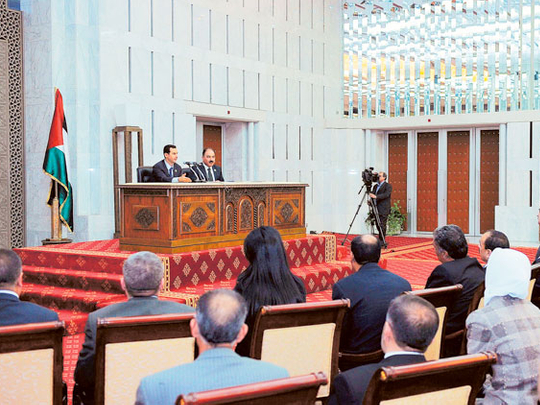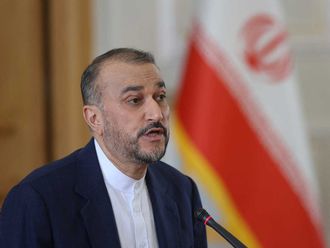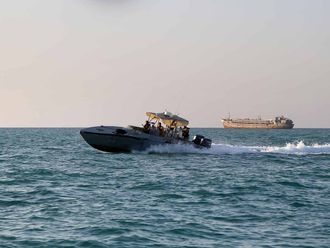
Beirut: As Syria’s civil war rumbles on unabated, President Bashar Al Assad looks more set to consolidate his leadership than heed calls to step aside.
Al Assad, 48, has said there’s no reason why he shouldn’t seek a third term as president in an election that’s unlikely to be much of a contest. Information Minister Omran Al Zoabi said Syrians will pressure him to stand and government-orchestrated pro-Al Assad rallies meant to highlight the president’s popularity have been taking place regularly for the past few months.
Opponents say running for re-election would destroy any chance of a political settlement at Geneva peace talks and prolong violence that has killed more than 150,000 people and displaced another 9 million. Though a date for the election has not been officially announced, there’s every indication he will defy international demands for him to depart, underscoring the impotence of the United States and European allies in trying to bring an end to three years of bloodshed.
“For those who need confirmation that the [Al] Assad regime is not interested in the Geneva negotiating process this would be it,” said Frederic Hof, senior fellow at the Atlantic Council’s Rafik Hariri Centre for the Middle East in Washington. He predicted another win for Al Assad in “the high 90s.”
In power since succeeding his father in 2000, Al Assad’s second seven-year term ends on July 17. Al Assad took over from Hafez, a former military commander who had been president since 1971. He won an additional seven-year term in 2007 with 98 per cent of the vote. He was the only candidate.
“We don’t want President [Al] Assad to hesitate for one second about standing,” Safwan Al Qodsi, whose Arab Socialist Union Party is allied with Al Assad’s Baath party, said by phone from Damascus. “Our conviction can be summed up in one sentence: There’s no one else other than Bashar [Al] Assad.”
The party has highlighted that message in its Al Mithaq newspaper and plans to stress during visits by its senior leadership to regional offices and incorporate support for Al Assad in the logo it will adopt closer to the vote.
Asked in January if he would run, Al Assad told Agence France-Presse that he could see “no reason why I shouldn’t stand.” And if “there is public desire and a public opinion in favor of my candidacy, I will not hesitate for a second to run for election,” he added. “In short, we can say that the chances for my candidacy are significant.”
Though he has lost large swathes of the country to the rebels, Al Assad has hung on to power longer than any of the four Arab leaders toppled by mass protests in 2011.
Robert Ford, who recently stepped down as US envoy to Syria, said on March 20 Al Assad is not likely to go away anytime soon. The elections will be held in government-controlled areas, which Ford estimated at about a quarter of the country.
“It is hard to imagine that [Al] Assad is going in the short term, and even in the medium term, to lose control of the area between Aleppo south to Damascus and then over to the coast,” Ford said at the event organised by the Washington-based Woodrow Wilson International Centre for Scholars.
Ford said three reasons have enabled Al Assad to survive: the inability of the opposition to assure the Alawite minority to which Al Assad belongs that it won’t be threatened, external support including Russian and Iranian financing and arms supplies and a “certain unity and coherence” within the Al Assad regime the opposition lacks.
The negotiations in Geneva have foundered before they properly took off, with both sides refusing to agree even on the agenda let alone a road map for peace.
Standing for another term would sound the “death knell” for the talks, said Oubai Shahbandar, a senior adviser to the Syrian opposition. It would be “a message from Bashar Al Assad that he believes in a military, and not a political solution,” said Badr Jamous, secretary-general of the Syrian National Coalition, the main political opposition.
Monzer Akbik, the coalition’s chief of staff, said his group won’t field any candidates in the vote.
“These are not elections,” he said. “Reform will come from changing the regime and not through it.”












